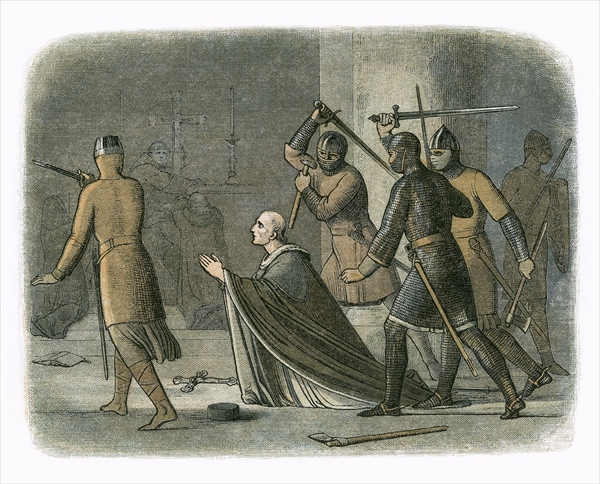[The martyrdom of St. Thomas Becket by four English knights on Dec. 29, 1170, ended violently the conflict between the saint and King Henry II. Edward Grim was an eyewitness and recorded the event in his Vita S. Thomae Cantuariensis Archepiscopi et Martyris (“Life of St. Thomas of Canterbury, Archbishop and Martyr”), published around 1180. St. Thomas’ memorial is Dec. 29.]
After the monks led him [Thomas] through the doors of the church, the four knights followed behind at a swift pace.
When the holy archbishop entered the cathedral the monks ceased their vespers and their glorification of God that had just commenced and ran to their father as they had heard he was dead; but they saw that he was alive and unharmed. They hurried to close the doors of the church to keep the enemies from murdering the archbishop, but the marvelous athlete turned and ordered that the doors be opened. “It is not proper that a house of prayer, a church of Christ, should be turned into a fortress as with its doors open, it is a fortress His people; we shall be victorious over the enemy through suffering rather than by combat. We suffer but do not resist.” The profane men then entered the house of peace and reconciliation and their swords were drawn. The very sight of them caused great terror among those who looked upon them.
The murderers followed him. “Absolve,” they cried, “and restore to communion those whom you have excommunicated, and restore their powers to those whom you have suspended.” The knights now advanced upon the shocked and confused people and demanded angrily: “Where is Thomas Becket, traitor of the king and kingdom?” Unperturbed, he [Thomas] answered, “The righteous shall be like a bold lion and free from fear.” He then descended and answered firmly but audibly, “Here I am, not a traitor of the king but a priest. Why do you look for me?”…
He answered, “There has been no satisfaction, and I will not absolve them.” “Then you shall die,” they sang, “and receive what you deserve.”
“I am ready,” he replied, “to die for my Lord, that in my blood the Church may obtain liberty and peace. But in the name of Almighty God, I forbid you to hurt my people whether clerk or lay”…
Then the unconquered martyr seeing the hour at hand which should put an end to this miserable life and give him straightway the crown of immortality promised by the Lord, inclined his neck as one who prays and joining his hands he lifted them up, and commended his cause and that of the Church to God, to St. Mary, and to the blessed martyr Denys. Scarce had he said the words than the wicked knight, fearing lest he should be rescued by the people and escape alive, leapt upon him suddenly and wounded this lamb who was sacrificed to God on the head, cutting off the top of the crown which the sacred unction of the chrism had dedicated to God; and by the same blow he wounded the arm of him who tells this. For he, when the others, both monks and clerks, fled, stuck close to the sainted archbishop and held him in his arms till the one he interposed was almost severed. Then he received a second blow on the head but still stood firm. At the third blow he fell on his knees and elbows, offering himself a living victim, and saying in a low voice, “For the Name of Jesus and the protection of the Church I am ready to embrace death.”
Then the third knight inflicted a terrible wound as he lay, by which the sword was broken against the pavement, and the crown which was large was separated from the head. The fourth knight prevented any from interfering so that the others might freely perpetrate the murder. As to the fifth, no knight but that clerk who had entered with the knights, that a fifth blow might not be wanting to the martyr who was in other things like to Christ, he put his foot on the neck of the holy priest and precious martyr, and, horrible to say, scattered his brain and blood over the pavement, calling out, “Let us away, knights; he will rise no more.”

